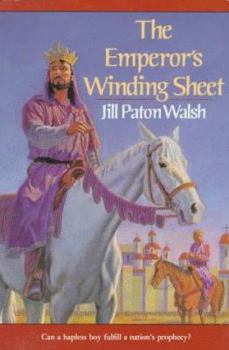The Emperor's Winding Sheet
Select Format
Select Condition 
Book Overview
In this winner of the Whitbread Children's Book Award, Walsh brings a meticulous eye for detail and storyteller's skill to this tale of the fall of Constantinople in 1453 and the siege that marked the... This description may be from another edition of this product.
Format:Paperback
Language:English
ISBN:0374421218
ISBN13:9780374421212
Release Date:April 1992
Publisher:Farrar Straus and Giroux
Length:273 Pages
Weight:0.65 lbs.
Dimensions:0.8" x 5.1" x 7.6"
Age Range:8 to 12 years
Grade Range:Grades 3 to 7
Customer Reviews
3 ratings
Excellent Historical Fiction--Fall of Constantinople
Published by Thriftbooks.com User , 14 years ago
This is an excellent book on a pertinent period of Byzantine history. It is a very well-written and well-researched historical novel. Having read Runciman's (a life-long Byzantine scholar) account of the Fall of Constantinople I found this novel to ring true, except I did not find the legend that gave Vrethiki his name. This is an adventure story wrapped around a a clash between two cultures and tremendous political intrigue. It highlights the emigration of Constantinople's cultured populace to Western Europe in the previous 50-100 years. This, in great part, supplied the minds and talent that spawned the Renaissance.
For the Life of the City
Published by Thriftbooks.com User , 14 years ago
It is well this book was written 35 years ago. It certainly could not have been written today. The Politically Correct New World Order will not allow one to speak favorably of the Eastern Orthodox or to criticize Islam. It tells the story of Vrethiki ("Lucky Find") who was shipwrecked on the Greek coast and forced to serve the Emperor Constantine XI. Vrethiki does not like his situation. The book tells of his transformation. He goes from a sullen, whiny slave to a friend of the Emperor. True, the late Byzantine empire had its decadent moments. And contra the blurb on the back of the book, the author doesn't really focus on the decadent aspects of the empire. Pros of the book: *Constantine XI is described as a man in terms of sheer greatness, which he was. Who would not gladly serve and die for a leader like that? *I like Stephanos. He is a very real character. He has some unsavory moments but he is probably the most life-like character. *Political Islam, especially the Ottoman Empire, is seen for what it is. Walsh is not slurring Islam--indeed, Turkish curates helped her in her research for this book--but simply quoting facts. Yes, Christians did bad things, too, but Jesus had already condemned that. Mohammed never condemned the brutality of his followers following the raid on Quresh. The Ottomans simply perfected the Prophet's technique. *This book paints a good picture of the Byzantine Empire and Ancient Orthodoxy. The Publishing houses today, controlled by the New World Order, would not allow her do do that today.
A fine read
Published by Thriftbooks.com User , 15 years ago
The setup is familiar to any reader of YA historical novels: take a character with whom your intended readers can identify, and drop that character into your story's time and place. This book's time and place is Constantinople at its fall to the Turks, and its protagonist is an English boy named Piers Barber. He's just old enough for his uncle to send him to sea aboard an English trade ship, after his father's sudden illness makes educating him further impossible. Piers, who through most of the book is called Vrethiki ("lucky find"), falls into the hands of pirates when his ship is wrecked. Somehow he winds up in Morea, starving and alone, and is taken into the household of Morea's Despot. Constantine, who soon afterward travels to the City - Constantinople - to be crowned as Emperor of the Romans. The Empire's last ruler, as it turns out; but Constantine already knows that is sure to happen. Although he does what he feels is required of him, by uniting the long-split Church into one body again, the Turks who ring Constantinople cannot be stopped from taking the City. Constantine moves toward his destiny without flinching from it, nevertheless. Author Walsh presents Piers Barber with a culture he initially finds not only alien, but heathen and horrifying, and follows her protagonist's gradual journey to understanding and respect. And finally, when the Emperor offers him a chance to escape from the doomed City, to affection and loyalty. Characters like Stephanos, the Eunuch of the Emperor's bedchamber, become real to the reader as Piers comes to know them; and that is well done, indeed. I found it hard to believe that Piers takes so long to learn even a smattering of the Greek in which everyone around him communicates. This, I suspect, the author uses deliberately as a plot device; depending on Stephanos and his ability to speak Latin (which Piers mastered in his English schooling) maintains the boy's dependence on Stephanos, and keeps the story as well as its protagonist from straying outside the Emperor's household. The sense of certain tragedy, of a sad end that can't be avoided, pervades the book from about its mid-point onward. There is nothing the author could have done about that, though; and the ending, when it finally comes, is filled with the universal hope of youth and survival. All in all, a fine read. --Reviewed by Nina M. Osier, author of HIGH PLACES and 2005 EPPIE winner REGS





